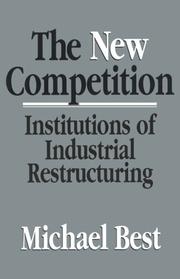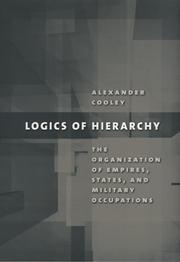| Listing 1 - 6 of 6 |
Sort by
|
Book
Year: 1961 Publisher: [New York] : Free Press of Glencoe,
Abstract | Keywords | Export | Availability | Bookmark
 Loading...
Loading...Choose an application
- Reference Manager
- EndNote
- RefWorks (Direct export to RefWorks)

ISBN: 9780674609266 0674609263 0674609255 Year: 1990 Publisher: Cambridge, Mass. : Harvard University Press,
Abstract | Keywords | Export | Availability | Bookmark
 Loading...
Loading...Choose an application
- Reference Manager
- EndNote
- RefWorks (Direct export to RefWorks)

ISBN: 0306429691 1489909141 1489909125 9780306429699 Year: 1988 Publisher: New York, NY : Plenum Press,
Abstract | Keywords | Export | Availability | Bookmark
 Loading...
Loading...Choose an application
- Reference Manager
- EndNote
- RefWorks (Direct export to RefWorks)
Gestion comparée --- Organisation comparée --- Comparative management. --- Comparative organization. --- Gestion comparée --- Organisation comparée --- Organization theory --- Management --- Cross-cultural studies. --- Comparative management --- Comparative organization --- Gestion --- Cross-cultural studies --- Etudes transculturelles --- Management - Cross-cultural studies. --- Management comparatif --- Organisation
Book
ISBN: 2867389062 9782867389061 Year: 1993 Volume: *6 Publisher: Paris Syros
Abstract | Keywords | Export | Availability | Bookmark
 Loading...
Loading...Choose an application
- Reference Manager
- EndNote
- RefWorks (Direct export to RefWorks)
Bibliotheek François Vercammen
Arbeidsverdeling --- Division du travail --- Division of labor --- Labor [Division of] --- Verdeling [Arbeids] --- Comparative management --- Comparative organization --- Corporate reorganizations --- Production management --- Gestion comparée --- Organisation comparée --- Entreprises --- Production --- Congresses --- Congrès --- Réorganisation --- Gestion --- congresses --- Gestion comparée --- Organisation comparée --- Congrès --- Réorganisation --- Organisation du travail --- Comparative management - Congresses --- Comparative organization - Congresses --- Corporate reorganizations - Congresses --- Production management - congresses

ISBN: 0801443865 1322503125 0801474833 0801462495 9780801443862 0801466393 9780801462498 9780801474835 9780801466397 Year: 2005 Publisher: Ithaca, NY : Cornell University Press,
Abstract | Keywords | Export | Availability | Bookmark
 Loading...
Loading...Choose an application
- Reference Manager
- EndNote
- RefWorks (Direct export to RefWorks)
Political science has had trouble generating models that unify the study of the formation and consolidation of various types of states and empires. The business-administration literature, however, has long experience in observing organizations. According to a dominant model in this field, business firms generally take one of two forms: unitary (U) or multidivisional (M). The U-form organizes its various elements along the lines of administrative functions, whereas the M-form governs its periphery according to geography and territory.In Logics of Hierarchy, Alexander Cooley applies this model to political hierarchies across different cultures, geographical settings, and historical eras to explain a variety of seemingly disparate processes: state formation, imperial governance, and territorial occupation. Cooley illustrates the power of this formal distinction with detailed accounts of the experiences of Central Asian republics in the Soviet and post-Soviet eras, and compares them to developments in the former Yugoslavia, the governance of modern European empires, Korea during and after Japanese occupation, and the recent U.S. occupation of Iraq.In applying this model, Logics of Hierarchy reveals the varying organizational ability of powerful states to promote institutional transformation in their political peripheries and the consequences of these formations in determining pathways of postimperial extrication and state-building. Its focus on the common organizational problems of hierarchical polities challenges much of the received wisdom about imperialism and postimperialism.
International relations. --- Comparative organization. --- Comparative government. --- Imperialism. --- Military occupation. --- Belligerent occupation --- De facto doctrine (International law) --- Occupation, Military --- Occupied territory --- Colonialism --- Empires --- Expansion (United States politics) --- Neocolonialism --- Comparative political systems --- Comparative politics --- Government, Comparative --- Political systems, Comparative --- Coexistence --- Foreign affairs --- Foreign policy --- Foreign relations --- Global governance --- Interdependence of nations --- International affairs --- Peaceful coexistence --- World order --- Organisation comparée --- Occupation militaire --- Internationale politiek. --- Armed Forces in foreign countries --- War (International law) --- Conquest, Right of --- Military government --- Political science --- Anti-imperialist movements --- Caesarism --- Chauvinism and jingoism --- Militarism --- Organization --- Organizational sociology --- National security --- Sovereignty --- World politics --- Relations internationales --- Institutions politiques comparées --- Impérialisme

ISBN: 0226468216 0226468208 9786611223793 1281223794 0226468585 9780226468587 Year: 1995 Volume: *2 Publisher: Chicago : University of Chicago Press,
Abstract | Keywords | Export | Availability | Bookmark
 Loading...
Loading...Choose an application
- Reference Manager
- EndNote
- RefWorks (Direct export to RefWorks)
Case studies that examine how firms coordinate economic activity in the face of asymmetric information-information not equally available to all parties-are the focus of this volume. In an ideal world, the market would be the optimal provider of coordination, but in the real world of incomplete information, some activities are better coordinated in other ways. Divided into three parts, this book addresses coordination within firms, at the borders of firms, and outside firms, providing a picture of the overall incidence and logic of economic coordination. The case studies-drawn from the late nineteenth and early twentieth century, when the modern business enterprise was evolving, address such issues as the relationship between coordination mechanisms and production techniques, the logic of coordination in industrial districts, and the consequences of regulation for coordination. Continuing the work on information and organization presented in the influential Inside the Business Enterprise, this book provides material for business historians and economists who want to study the development of the dissemination of information and the coordination of economic activity within and between firms.
Business intelligence --- Comparative organization --- Industrial organization (Economic theory) --- Industrial organization --- Intelligence économique --- Organisation comparée --- Economie industrielle --- Congresses --- History --- Congrès --- 658.11 --- Kinds and forms of enterprise --- Congresses. --- 658.11 Kinds and forms of enterprise --- Intelligence économique --- Organisation comparée --- Congrès --- Organization --- Organizational sociology --- Business espionage --- Competitive intelligence --- Corporate intelligence --- Economic espionage --- Espionage, Business --- Espionage, Economic --- Espionage, Industrial --- Industrial espionage --- Intelligence, Business --- Intelligence, Corporate --- Business ethics --- Competition, Unfair --- Industrial management --- Confidential business information --- Industries --- Industrial concentration --- Industrial sociology --- History&delete& --- Business --- Information --- Management --- E-books --- United States --- Business intelligence - Congresses. --- Comparative organization - Congresses. --- Industrial organization - History - Congresses. --- Industrial organization - United States - History - Congresses. --- management, organization, coordination, competition, firms, business, economics, nonfiction, asymmetric information, production, industry, compensation, interwar, automobile, industrial engineering, technology, innovation, antitrust, regulation, research and development, thomson-houston electric company, mortgage lending, life insurance, finance, germany, united kingdom, universal banking.
| Listing 1 - 6 of 6 |
Sort by
|

 Search
Search Feedback
Feedback About
About Help
Help News
News